
The Buddha of Suburbia is the nineteenth studio album by the English musician David Bowie, originally released on 8 November 1993 through Arista Records in the United Kingdom and Europe. The project originated following an interview between Bowie and novelist Hanif Kureishi during a press tour for Black Tie White Noise (1993), where Bowie agreed to compose music for an upcoming adaptation of Kureishi's novel The Buddha of Suburbia (1990). After making basic tracks, Bowie decided to turn the project into a full album. Working with musician Erdal Kızılçay, recording took place at Mountain Studios in Montreux, Switzerland and was completed in six days; Mike Garson contributed piano overdubs.
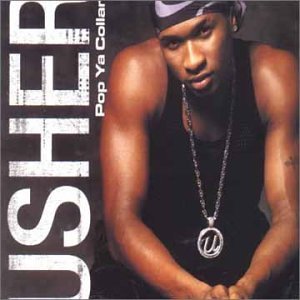
"Pop Ya Collar" is a single by American recording artist Usher, released to US radio on October 17, 2000. It was written by himself, Kevin "She'kspere" Briggs, and Kandi Burruss. The song was produced for his cancelled third studio album All About U. The project was abandoned following the leak of the song and several other tracks onto online music store Napster, several months prior to its release of October 31, 2000. The song was instead later included on non-US editions of his official third studio album, 8701.

"Hunter" is a song by British singer Dido from her debut album, No Angel (1999). The song was released as the third single from the album in the United States on 18 June 2001. "Hunter" reached number 17 on the UK Singles Chart and peaked within the top 50 in Australia, France, Greece, Ireland, and New Zealand. In the US, it entered the top 20 on two Billboard charts.

"Smooth" is a song performed by American rock band Santana and Rob Thomas of Matchbox Twenty, who sings the lead vocals. It was released to radio on June 15, 1999, as the lead single from Santana's 1999 studio album, Supernatural. It was physically released as a single in August. It was written by Itaal Shur and Thomas, who re-wrote Shur's original melody and lyrics, and produced by Matt Serletic.

"Black Tie White Noise" is the title track from British singer-songwriter and actor David Bowie's 18th album of the same name (1993). Featuring guest vocals by Al B. Sure!, it was written by Bowie, produced by Nile Rodgers and released as the second single from the album in June 1993 by Arista, BMG and Savage. It peaked at number 36 in the UK. The accompanying music video for the song was directed by Mark Romanek.

"Miracle Goodnight" is a song by English singer-songwriter David Bowie, released in October 1993 by Arista Records as the third and final single from his 18th studio album, Black Tie White Noise (1993). The song was written by Bowie and produced by Nile Rodgers. It reached number 40 on the UK Singles Chart. The accompanying music video was directed by Matthew Rolston.
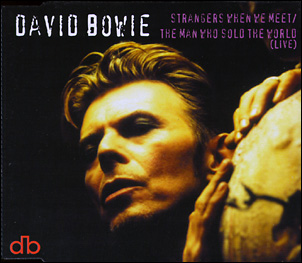
"Strangers When We Meet" is a song by English musician David Bowie, originally recorded for his 1993 album The Buddha of Suburbia. In 1995, Bowie re-recorded the song for his 20th studio album, Outside (1995), and this version was edited and released in November 1995 by RCA as the second single from the album, paired with a reworked version of Bowie's 1970 song "The Man Who Sold the World". The double A-side reached number 39 on the UK Singles Chart. In Sweden, "Strangers When We Meet" peaked at number 56 in 1996.

"The First Night" is a song by American singer Monica for her second studio album, The Boy Is Mine (1998). It was written by Tamara Savage and Jermaine Dupri, featuring production and additional vocals from the latter. Built around a sample of Diana Ross's 1976 recording "Love Hangover", penned by Marilyn McLeod and Pam Sawyer, who share co-writing credits, the song is about the protagonist's battle with sexual temptations on the night of her first date, despite her conflicting emotions and strong sexual desires.
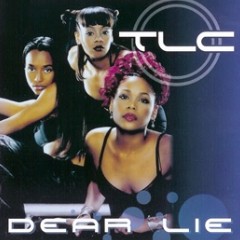
"Dear Lie" is a song by American group TLC. It was written by Kenneth "Babyface" Edmonds and band member Tionne "T-Boz" Watkins for the trio's third studio album FanMail (1999), featuring production by Edmonds. The song was released as the album's third and final single on December 6, 1999, peaking at number 51 on the US Billboard Hot 100 and reaching the top 40 in several other countries. "Dear Lie" is included on the group's 2009 compilation album, We Love TLC.

"Here with Me" is the debut single of English singer-songwriter Dido. It was the first single she released from her 1999 debut studio album, No Angel. The song was written about her then-boyfriend Bob Page. The single was released on 17 May 1999 in the United States but was not released in the United Kingdom until February 2001, serving as Dido's debut single in her home country. In other territories, it was issued as the album's second single, following "Thank You". Shortly after its release, "Here with Me" was used as the theme song for the American science fiction television programme Roswell (1999–2002).
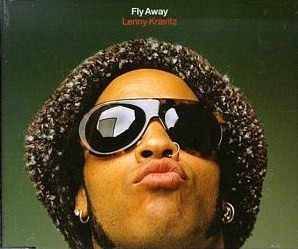
"Fly Away" is a song by American singer Lenny Kravitz. It was released as the fourth single from his fifth studio album, 5 (1998). Released to the radio on May 11, 1998, "Fly Away" peaked at number 12 on the Billboard Hot 100. Outside of the United States, "Fly Away" topped the charts in Iceland and the United Kingdom, and peaked within the top ten of the charts in several countries, including Australia, Canada, New Zealand, and the Republic of Ireland. The song won a Grammy Award for Best Male Rock Performance in 1999.

Believe in Me is Duff McKagan's first solo album, released on September 14, 1993. It peaked at number 137 on the Billboard 200 and is believed to have sold about 100,000 copies worldwide.

"Swear It Again" is a song by Irish boy band Westlife. The ballad was released on 19 April 1999 in the United Kingdom as the first single from their self-titled debut album (1999). The song peaked at number one on the UK Singles Chart for two weeks, giving Westlife their first of 14 UK number-one singles. "Swear It Again" is Westlife's only single to have charted in the US, peaking at number 20 on the Billboard Hot 100 and ranking number 75 on the Billboard Hot 100 year-end chart in 2000.

"So Help Me Girl" is a song written by Howard Perdew and Andy Spooner and recorded by American country music singer Joe Diffie. It was released in January 1995 as the third single from his fourth studio album, Third Rock from the Sun (1994). The song reached number two on the Billboard Hot Country Singles & Tracks chart, where it debuted at number 59 for the week of February 4, 1995, and number 84 on the Billboard Hot 100.

"Are You Gonna Go My Way" is a song by American musician Lenny Kravitz, released in February 1993 by Virgin Records as the first single from his third studio album, Are You Gonna Go My Way (1993). The song was written by Kravitz and Craig Ross, while Kravitz produced it. It peaked at number one in Australia and number four on the UK Singles Chart, as well as number one on the US Billboard Album Rock Tracks chart and number two on the Billboard Modern Rock Tracks chart. Its music video was directed by Mark Romanek.
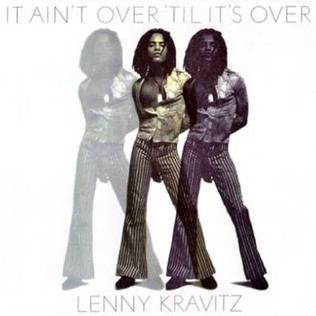
"It Ain't Over 'til It's Over" is a song written, produced, and performed by American musician Lenny Kravitz for his second studio album, Mama Said (1991). Released as the album's second single in June 1991 by Virgin, the song is a mid-tempo ballad musically inspired by Motown, Philly soul, and Earth, Wind & Fire. The horn line at the end is performed by the Phenix Horns from Earth, Wind & Fire. "That song just came out one day, and I knew it had a classic vibe. And I still love that song very much today," Kravitz said in an interview for VivaMusic.com in 2000. The line is based on a Yogiism, or quotation from Yogi Berra: "It ain't over 'til it's over."
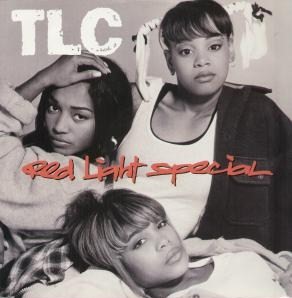
"Red Light Special" is a song by American vocal girl group TLC for their second studio album, CrazySexyCool (1994). Written and produced by Babyface, LaFace and Arista Records released the song as the second single from the album on February 17, 1995. The song achieved chart success, reaching number one on the US Billboard Top 40/Rhythm-Crossover chart and number two on the Billboard Hot 100 chart. Matthew Rolston filmed its music video, which features the group performing in a brothel.

"Adia" is a song by Canadian singer Sarah McLachlan from her fourth studio album, Surfacing (1997). It was co-written by McLachlan and her longtime producer, Pierre Marchand. McLachlan has said about the song, "...more than anything, it's about my problems in dealing with feeling responsible for everyone else". "Adia" was released as the third North American single from Surfacing on 2 March 1998; in Europe, it served as McLachlan's debut single, receiving a UK release in September 1998.

"The Block Party" is the debut solo single by American singer and rapper Lisa "Left Eye" Lopes, member of the girl group TLC. It was released following multiple collaborations with big name artists such as Donell Jones and Melanie C. The track was written by Lopes, Salaam Remi, Maurice White, and Tracey Horton, with Remi providing production. The track was first released on July 24, 2001, to American radio as the lead and only single from her solo debut studio album Supernova (2001), which would only be released internationally. A sample of Earth, Wind & Fire's song "Drum Song" is played throughout the track.

Brilliant Adventure (1992–2001) is a box set by English singer-songwriter David Bowie, released on 26 November 2021. A follow-up to the compilations Five Years (1969–1973), Who Can I Be Now? (1974–1976), A New Career in a New Town (1977–1982) and Loving the Alien (1983–1988), the set covers the period of Bowie's career from 1992 to 2001, commonly regarded by analysts as an artistic renaissance following his commercially successful but critically maligned work in the 1980s. However, Bowie's 1988–1992 tenure with the hard rock group Tin Machine is excluded. The set comprises eleven compact discs or 18 LPs.




















